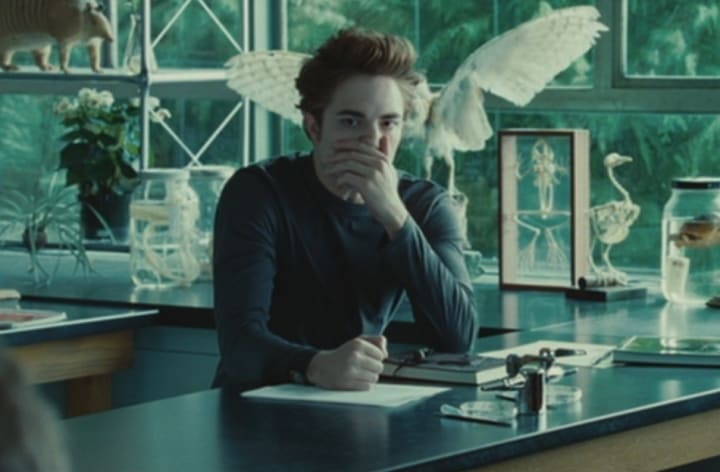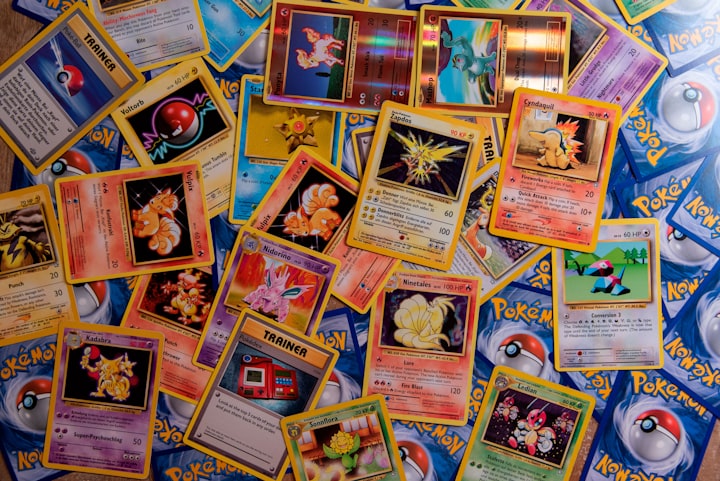The Art of Fan Fiction
The Lifeblood of Fandom

Picture your favorite movie franchise, your favorite comfort read, or favorite show to binge. What is it about these things that captured you, made you hold it above others? Have they changed you in some way? Do you feel a sort of emotional attachment to the characters? Maybe it was the first time you fervently enjoyed something in a certain genre. Whatever it is, the reality is that you’re never going to be alone in that feeling. The beauty of the pervasiveness of entertainment media is that there are hundreds of thousands or even millions of people who experienced and love the same things you do. Bonds have formed over shared love of a book. Friendships have strengthened over shared interests that were once thought obscure. Family time has been saved many a time by a fun, old movie. This is what it is to be a part of a fandom.
But as you probably know, there’s an area of fandom more zealous than the majority. Instead of the consumption of media, it deals with creation. What I’m referring to, of course, is fan fiction. “Fan fiction,” often written as fanfiction, is defined by Merriam-Webster as “stories involving popular fictional characters that are written by fans and often posted on the internet.” It denotes those who have been so moved by a piece of consumable media (either positively or negatively) that they’re inclined to create something in relation to it because of it. Despite having its roots in the Sherlock Holmes fandom dating back to the late 1800s (I’m totally serious, look that up) and being popularized with Star Trek in the 1960s, the casual observer may still roll their eyes and dismiss it as a phase of this generation’s teenage frivolity.
As a result, just the mention of fanfiction can be a high risk/high reward social situation. At best, you’ll find someone else who engages in it and understands its nuance. You might even share in-fandom jokes and memes. At worst, you’re judged as a weirdo and your friends’ perceptions of you are knocked down a peg (and for middle ground, you end up writing an article about fanfiction online). But I assure you, fanfiction is much more than all of that. It is, unequivocally, its own form of art as legitimate as anything else made and presented. Lots of people would disagree with that sentiment, but even published works whose fame and validity would not be questioned started as, or can be denoted as, fanfiction. Let’s dig deeper, shall we?
One very famous published example from recent years is the 50 Shades of Grey series, which started as Twilight fanfiction. If this is the first time you’re hearing this, then I apologize for being the one to break the news to you. That mix of befuddlement and discomfort will pass in a few minutes.

But regardless of what you think about fanfiction (or the quality of those franchises themselves), the erotic series was published and sold millions of copies. Its legitimacy and validity can no longer be disputed as a “hobby” or just a “passing interest.”
Another example of published fanfiction created through appreciation would be Rick Riordan’s Percy Jackson and the Olympians book series. Admittedly, the main premise is his own based on bedtime stories he would tell his son. Yet, in truth, it really is just modern fanfiction of Greek mythology peppered with original characters. Riordan is quite the prolific author with millions of books sold, and over half of those sales are based in fanfiction. Had Riordan or E. L. James not had these interests, millions of other people around the world would not have experienced their works. Their fans may not have discovered the motivation to create that they once felt.
Appreciation and Frustration
Fiction writing is itself an art, and writers both published and not-yet-published found inspiration to do so somewhere. Maybe you, reading this right now, once had the itch to throw your imagination onto paper. I know I did, and still do. In regards to fanfiction, one specific catalyst for inspiration is appreciation, and it’s obvious why. Everything must come to an end, but stories stick with fans long after they finish a book series or movie franchise. Writing fanfiction keeps the passion for something they loved alive, while also cultivating their love of writing.
Now concerning the average member of a fandom, appreciation usually leads to fanfiction of AUs, or alternate universes, where fans take the established setting from a published work and change it. Most tend to fit a mold or stereotype that’s romantic in nature, such as “coffee shop,” “college,” or “high school” AUs. It’s popular for fans to take canon ships (relationships), or more likely non-canon ships, and apply them to novel scenarios outside of canon. It’s basically saying something like “Wow! I love Harry and Ginny together! But…what if Harry was a barista and Ginny was a regular at his shop?” and then writing it. Let me put that a different way. That’s like looking at a picture of the Eiffel Tower and saying “That looks fantastic, but what if it was a different color?” and then painting it that way. In each scenario, fans are creating art out of appreciation and adding their own personal changes. The second would be readily accepted, so why not the first?
Of course, appreciation isn’t the only reason for fanfiction. In fact, I’d wager that more members of fandom write out of frustration than appreciation. Given how polarizing some books and movies can be (did you see the last Star Wars film?), that’s not really much of a surprise. It’s human nature to be dissatisfied with things. There are many causes of frustration, but I’ll only touch on three here. The first is a lack of representation in media, where certain races, levels of mental or physical ability, sexual orientation and gender identities are simply not present at all, or presented as throwaway examples with no agency. The second is what can be interpreted as bad writing, from large plot holes to things that are blatantly out of character when compared to previously established canon (here’s looking at you, Game of Thrones Season 8). Last is likely the most polarizing of all, the frustration of non-canon ships. Fans create their own stories to “fix” things they feel need to be corrected within the source material, usually stemming from these three. Disagreements using art in this vein are usually more subtle in the world of published media, but I’ll try to equate this with one hilarious not-so-subtle example.
You may have heard of Vantablack, a material regarded as one of the darkest substances on the planet since it absorbs 99.96% percent of all visible light that hits it. In 2016, an artist named Anish Kapoor acquired exclusive rights to the material, so now he is the only one who can actually use it. Realistically speaking, Vantablack is military grade material and your average studio artist wouldn’t be able to use it anyway – it’s simply too expensive and too difficult to make. However, this act of blatant greed and artistic elitism led artist Stuart Semple to create his own version of the blackest black called Black 2.0 that would be available to the masses. It, as well as the updated Black 3.0 is affordable and available for anyone to buy on his website except for, per the Terms of Service, Anish Kapoor.

Now, this act of badassery on Semple’s part takes reacting to someone else’s artistic ownership to the extreme. The point of this anecdote (other than that it’s great on its own) is that people have been passionately reacting to other people’s art with art of their own since forever, and will continue to do so no matter the medium. Fanfiction is just another example of this, specific to writing.
Art as an Artist Does
Going even further, I would propose that fanfiction is integral to the artistic development and improvement of those who write it, as it is produced and consumed. High school and college writing courses endeavor to do the same through workshops and writing assignments, but fanfiction comes with the pleasure of interacting with something you already enjoy without the pressure of an impending grade. In the case of fans venturing to “fix” the source material in a fic, it takes considerable comprehension and analytical skills to properly discern what you think is wrong in a medium, as well as why. It takes even more to devise a way to improve it coherently. Asking “What would I have done differently?” is a great exercise for writers if they are willing to fully flesh out their stories, which fic writers are wont to do. Seriously, it’s the oldest advice in the book. All writing teachers will tell you – if you want to get better at writing, you read, write, then read again and write some more.
Writing fanfiction also gives insight into writing for an audience, as published artists do. Stories posted online are submitted so they can be read by those who peruse these sites. The breakdown of views, comments, tags, and more on sites like fanfiction.net and archiveofourown.org gives writers crucial feedback. Professional writers go through this same process all the time, specifically those who write for television programs. The only difference is that their work is published in an official capacity (they’re getting paid for it). A lot of them understand this intimately, insofar as they engage directly with fans on social media, or in the case of Supernatural, go full “meta” and reference its own fanfiction within the show. Publishing and showrunning teams’ acknowledgment of fandom and the art that comes out of it is no doubt meant to be an avenue by which they can maintain and increase revenue, but it serves to legitimize fandom and by extension its art. Fandom art has actually been acknowledged in an official capacity itself. Though not for writing, Ukrainian artist Viria gained renown through the Percy Jackson fandom for her digital fan art and in 2017 her illustrations became the pentalogy's official art on Rick Riordan’s website. Check it out. Her art is stunning and captures the characters perfectly.
In reality, those who write fanfiction are artists like any who are moved to creation. It can be a way to become a better writer, to be acknowledged, or simply to enjoy yourself. But just as important, fic writers provide more media within a fandom for those who wish to read them and not write, doing its small part to make the web that connects one fan to another even bigger. It serves to uphold the camaraderie brought by a fandom’s mutual enjoyment of something with the power to capture people on a large scale. And honestly, that’s pretty cool.






Comments
There are no comments for this story
Be the first to respond and start the conversation.